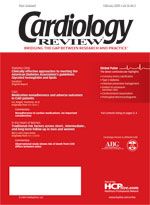Publication
Article
Cardiology Review® Online
Nonadherence to cardiac medications: An important consideration
Author(s):
In a well-done recent study, Dr P. Michael Ho and colleagues confirm previous data and clinical observations that many patients are nonadherent to their cardiac medications, and, importantly, this nonadherence adversely impacts outcomes, including cardiovascular mortality.
In a well-done recent study, Dr P. Michael Ho and colleagues confirm previous data and clinical observations that many patients are nonadherent to their cardiac medications, and, importantly, this nonadherence adversely impacts outcomes, including cardiovascular mortality. Although the findings of this study probably can be generalized widely, it should be noted that the patients were associated with a Veterans Affairs hospital system (Denver VA Medical Center) and a managed care organization (Kaiser Permanente). This explains both the high proportion of men, which may increase nonadherence, and the removal of significant financial barriers, which may protect against nonadherence. The agents studied were beta blockers, statins, or angiotensin-converting enzyme inhibitors, which have been proven to improve morbidity and mortality in coronary artery disease (CAD) patients. Despite the ability of modern drugs to positively affect outcomes, adherence is a persistent problem in clinical practice, even when financial barriers are omitted.
Clinical trials, on which guidelines are based, consistently overstate the benefit of various therapies. The patients are given a large amount of attention and reinforcement, including pill counts, prestudy education on drugs, and reimbursement for time and travel. Study assistants often call to remind research subjects of upcoming visits, and missed appointments are assiduously monitored. These multiple approaches are time-consuming and costly. In most clinical settings, time and resources are sparse and the methods used in clinical trials cannot be widely replicated.
Kaiser Permanente of Colorado has automated databases consisting of hospitalization records and outpatient diagnoses. This not only assisted with the collection of data for this research, but confirms the need for widespread use of electronic medical records. The barely legible, cryptic notes of an individual practitioner may overlie excellent one-to-one care, but the use of an easily accessible, legible electronic record makes care more portable and accessible, with adherence to recommended guidelines determined. As with all retrospective studies, this research has the potential for selection bias. Fortunately, the researchers included patients who had at least 6 months of continuous follow-up and objectively quantified adherence, allowing for confidence in the findings.
The choices of primary outcomes of all-cause and cardiovascular mortality and secondary outcomes including hospitalization for acute myocardial infarction or heart failure and coronary revascularization make these findings compelling. As previously noted, in a closed system with electronic records, longitudinal care is facilitated. In the study by Ho and colleagues, follow-up and vital status information was available for 99% of subjects; however, retrospectively, it was not possible to identify specific reasons for treatment discontinuation.
Another significant aspect of Ho and colleagues’ research was the effort to assess whether the association between adherence and outcomes resulted from a “healthy adherer” effect. To determine this, nonadherence to proton pump inhibitor or H2 antagonist regimens and outcomes were examined. Lack of adherence to these medications was not associated with adverse outcomes, suggesting that the lower risk of adverse outcomes associated with adherence to cardiac medications was due mainly to the direct benefits of these cardioprotective medications rather than a healthy adherer effect. The authors found that the levels of nonadherence were distressingly high. Interestingly, younger (not older) patients were more likely to be nonadherent, along with patients suffering from depression.
Depression is increasingly recognized as a challenge to obtaining positive outcomes in CAD patients. Evidence in recent literature supports routine screening for depression in patients with heart disease and referring these patients to a qualified mental health professional for close monitoring.1 An advisory issued by the American Heart Association and endorsed by the American Psychiatric Association encourages this approach and builds on the concept that untreated depression is associated with worse outcomes. Additionally, a randomized controlled trial at an integrated group practice in Seattle evaluated a new model of care that included patient Web services, home blood pressure monitoring, and pharmacist-assisted care to see if there is an improvement in blood pressure and other cardiovascular risk factors compared with usual care.2 Pharmacist care management delivered through secure patient Web communications resulted in improved blood pressure control in hypertensive patients. This study provides further evidence that consistent counseling and close patient monitoring may result in improved cardiovascular outcomes.
As health reform progresses in the future, decreasing cardiovascular health disparities will become an area of increasing focus. A multitude of factors affect poorer outcomes related to race, ethnicity, and disadvantaged socioeconomic status. Poor adherence is a prominent factor in adverse outcomes in urban clinics. A study from New Orleans confirmed that younger adults were less adherent to antihypertensive therapy, and less adherence was directly linked to social factors, such as caring for dependents, uncomfortable doctor-patient communication, male sex, and being black.3 Addressing these social and cultural factors is apparently as important as cost and access in increasing adherence. The work of Dr Ho and colleagues adds to our understanding of the impact of nonadherence that is associated with significantly adverse outcomes, including increased risk for all-cause mortality, cardiovascular mortality, hospitalization for acute myocardial infarction or heart failure, and coronary revascularization procedures. Medication that is not taken cannot be effective. Along with unraveling the mysteries of genomics and expanding breakthroughs in pharmacotherapy, expert care will only be accomplished through the appropriate education and support of medication adherence for each patient.






